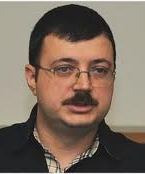UNIBUC
University of Bucharest - Department Of Systems Ecology And Sustainability, UNIBUC-DSES (ROMANIA)
REFERENCE PERSONS
Mihai Adamescu, Angheluta Vadineanu
WORKING TEAM
Constantin Cazacu, Magda Bucur, Nicoleta Geamana, Elena Preda, Sergiu Cristofor
The Department of Systems Ecology and Sustainability (UNIBUC-DSES) consists of i) the Masters and Doctoral School in Systems Ecology and Sustainability and ii) the research centre which integrates laboratories and their logistics from Bucharest and two fields stations located in Sinaia (Southern Carpathians) and Braila (Lower Danube River). The department has 27 academic and research positions, 16 PhDs, 20 MSc students and 16 technical staff. In the last 20 years the department has received international visibility and credibility through its involvement in European networks and projects including ERMAS 1 and 2, NICOLAS, EMERGE, DANUBS, FAEWE, FARO, EVALUWET, SOBIO, ALTER-NET, EUROLIMPACS, AQUAMONEY and more recently in FP7 projects like: EBONE, VOLANTE, GENESIS, SPIRAL.
DSES-UNIBUC is playing a catalytic and leading role in the development of the national network of teams and platforms for long term and multi- and trans-disciplinary research on local and sub-regional socio-ecological complexes (through national projects like SEcS – RO/NURC/2005-2008). The staff has expertise in research on biological and ecological mechanisms and processes for understanding and modeling the dynamics of the structure, productivity and resilience of different ecological systems; applied research dealing with: rehabilitation and reconstruction of landscapes for diffuse pollution control and biodiversity conservation in rural areas; wetlands conservation and restoration; biodiversity conservation and sustainable use of ecosystems; development and management of the network of protected areas; social and economic analysis of the ecosystem functions. Through its involvement in different projects (e.g. SOBIO, ALTERNET, BIOFORUM, and Life Nature), the Department has made direct connections between science and the development of conservation plans, social research in support of biodiversity management, conflict management and the development of the science-policy interface.








